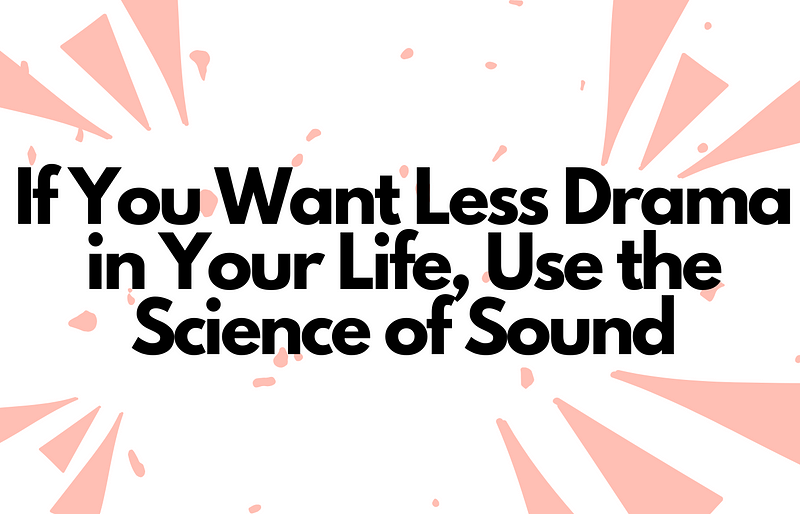Finding Peace: How to Eliminate Drama Using Sound Science
Written on
Understanding Drama Dynamics
Are you tired of the never-ending drama that drains your energy and time? Fortunately, you can almost immediately reduce it by applying the principles of sound.

While I strive for a life with minimal drama, I have three children who sometimes bring their own chaos into the mix. Over time, I've come to realize that drama requires three essential components:
- A person to create the drama.
- A medium for the drama to flow through.
- An audience to receive it.
By eliminating any one of these elements, you can transform drama into a serene silence, much like sound waves dissipating.
Before you can address the elements causing your personal drama, it’s crucial to identify your role in it. This can often be a challenging task.
It's important to clarify that I'm not referring to situations where friends genuinely need help. Instead, these insights are for those who engage in drama purely for the sake of it.
Identifying Your Role in Drama
Are you the one generating the drama?
If you find yourself at the center of frequent drama, it's likely that you are either instigating it or acting as a reliable recipient. For instance, I have two dear friends who frequently call me to vent about each other's work behaviors. Initially, I thought I was being supportive, but I later realized that my intervention was merely escalating the situation.
Upon recognizing my part in this ongoing drama, I took the step to apologize and suggested that we communicate more directly about our grievances. This simple shift allowed the tension to dissipate.
Are You the Medium for Drama?
I used to be part of many Facebook groups, often hesitant to mute or block individuals for fear of offending them. However, I soon recognized that these platforms often foster a toxic environment filled with negativity.
Now, I limit myself to a few select groups that provide positive interactions, allowing me to connect with friends and share knowledge without the drama. Just like sound needs a medium to travel through, drama thrives in environments that encourage it. If certain friends or social media spaces are causing you stress, it may be time to reassess your connections.
Are You the Recipient of Drama?
For years, I believed I was an excellent listener, often finding myself the go-to person for others' problems. However, I was simply too polite to decline their requests for a listening ear.
To reclaim my peace, I began to ask clarifying questions when someone approached me with their drama. Questions like:
- Do you need someone to listen, get involved, or provide advice?
- Have you discussed your feelings with the person involved?
- What outcome are you hoping for in this situation?
By doing this, I quickly conveyed that I was not interested in engaging in drama.
So, which role do you play? Are you the creator, the conduit, or the recipient of drama? Sometimes, we may even embody all three roles. If you're like me, you strive to maintain your own space and avoid unnecessary turmoil.
In this video titled "4 Simple Ways to Stop Caring What Others Think of You," Mel Robbins shares strategies that can help you focus on your own well-being rather than getting caught up in the opinions of others.
This video "Meet the Instrument: Flute" provides an engaging introduction to the flute, exploring its sound and role in music, which can serve as a metaphor for finding harmony in your life.
Explore More Insights
If you enjoyed this content, consider reading these popular articles by Sarah Cottrell:
- The Science Behind Why Your Picky Eater Refuses to Eat Vegetables
- Is Your Child Gifted? These 10 Signs Point to Yes. Probably.
- Meditation Is Not Safe or Even Good for Everyone, Here’s Why I Quit